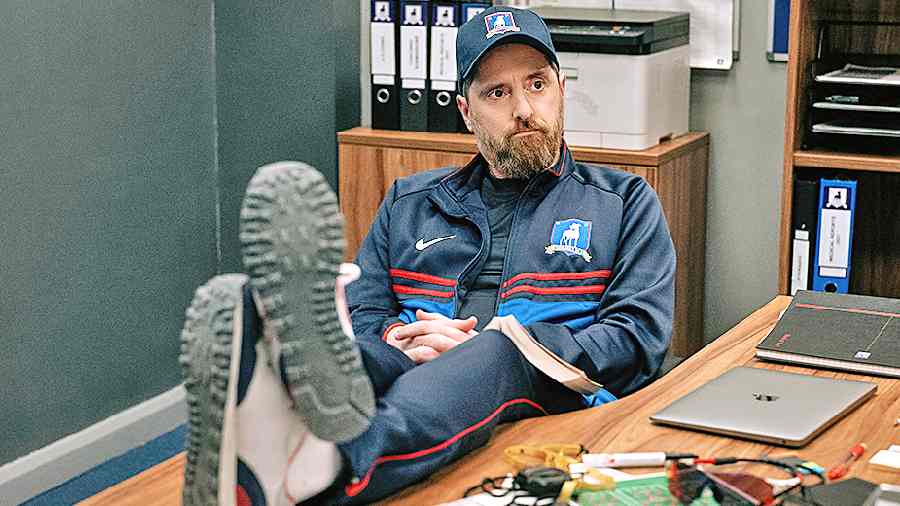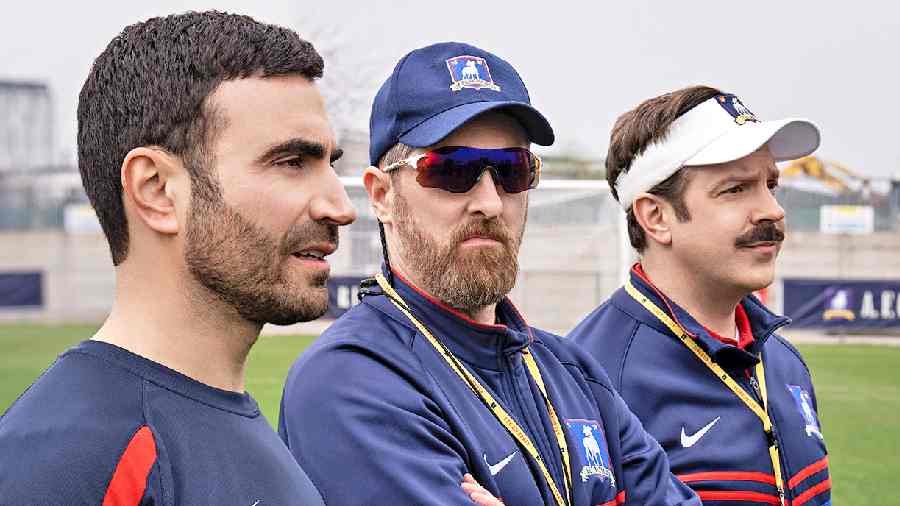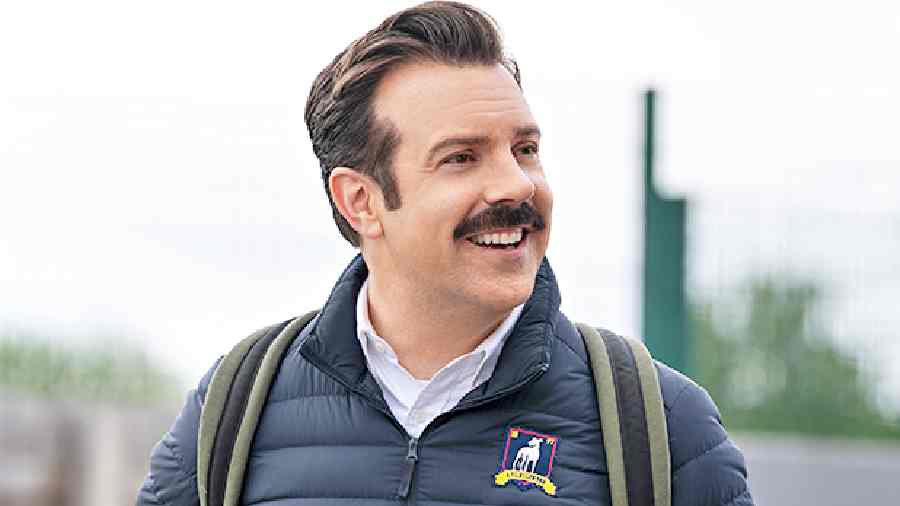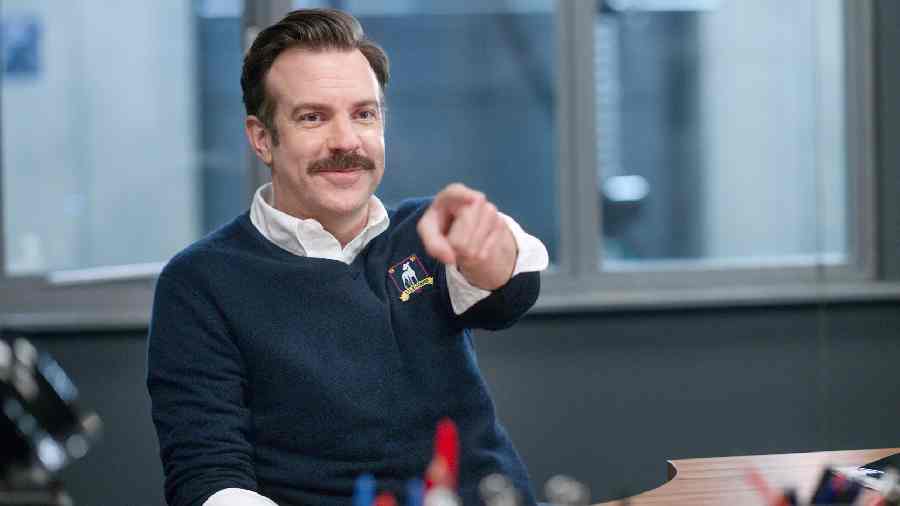W ill it or won’t it end? Rarely do we get a television show that unites viewers globally. Ted Lasso has overwhelmed everyone with its kindness as if it’s an antidote to doom-and-gloom happenings around the world, be it the pandemic, political shifts or financial instability. With the third season rolling in on March 15 on Apple TV+, Jason Sudeikis, one of the show’s developers as well as the man who slips into the shoes of the titular character, is constantly being asked to offer a clear answer on whether this would be the final season.
Frankly, does it matter? Hasn’t it given us enough lines to cling on to for years to come — “You know what the happiest animal on Earth is? It’s a goldfish. You know why? It’s got a 10-second memory”, and “If the Internet has taught us anything, it’s that sometimes it’s easier to speak our minds anonymously”.
The lasting impact of Ted Lasso will perhaps be the way in which life lessons have been made to appear incidental. Sudeikis and team wanted to deliver pure comedy — with remarkable consistency — that’s sophisticated but not pretentious.
“I would prefer had couples gone on date nights and kids went to school and played with their friends. If we helped folks through the weird, odd times, I am very happy,” says Sudeikis on video. He is talking about how the show became a household hit while the pandemic went from its early days to a nightmarish peak.
Ted Lasso is the dark knight many root for during a football World Cup. If it loses, there will always be our “well played, well played” and on winning the trophy, popping of champagne corks will be heard. It’s a win-win situation for a show that has football as the backdrop but then, it’s not about sports.
A TICKET TO ‘BIG EMOTIONS
To jog one’s memory, this is the story of an American football coach from Kansas City who arrives in England to help an English football team. Hired by AFC Richmond owner Rebecca Welton (Hannah Waddingham) to sabotage the team only to punish her adulterous exhusband, Ted not only wins her over with optimism, he makes her the club’s biggest fan. Helping him along the way are Coach Beard (played by Brendan Hunt), Lasso’s grounded, laconic longtime assistant and friend, and Nathan Shelley (Nick Mohammed), (former) assistant coach. Of course, a lot of water has flown under the bridge since this simple set-up. Nathan has switched sides and has moved to West Ham United while hot-headed Roy Kent (played by Brett Goldstein), the retired box-to-box midfielder, has become assistant coach of AFC Richmond.
If you think all the action unfolds on the field, let’s be clear: It doesn’t. Ted Lasso is a show about love, life, heartbreak, lessons, second chances and whatnot. Achieving the task hasn’t been the easiest one but there has been a steady evolution of the storyline from the field to the lockerroom to outside the stadium and into the homes (and lives) of the characters.
Brendan Hunt, who has been a friend of Sudeikis for decades and is also a developer of the show, tells t2oS: “We live in a country (the US) where football is not super popular. It’s making great strides. Very early on in the writing process, Bill Lawrence, our esteemed showrunner, said quite loudly and pretty much looking directly into my eyes: ‘It’s not a show about soccer. It’s a workplace comedy.’ That has been a good advice the whole way. If it was to have just been about a sport, it would have been a shallow show. It always had to be about the people and the relationships. But it’s in the world of sport which can be a shortcut to high stakes and big emotions. That’s only there to feed the other stuff, which is always more essential.”

Juno Temple and Hannah Waddingham

Brendan Hunt, who plays Coach Beard, has been a longtime friend of Jason Sudeikis

In the third season, Nick Mohammed and Jason Sudeikis are on opposite sides
Ted Lasso also highlights the tone of modern television viewing — earnest rather than the brooding detachment highlighted on many shows that came, say, a couple of decades ago. Ricky Gervais’s David Brent (The Office) defines the comedy of the early aughts while the genre today is in the hands of Ted Lasso. Brent comes across as self-centred while Lasso is a perfect example of kindness, who encourages his players to be psychologically healthy. He is as sweet as a pain au chocolat meant to be dipped into cafe-au-lait.
The Apple TV+ show is far removed from the world of Seinfeld and the shows that followed it. It’s not like The Sopranos, which you could enjoy even without rooting for any particular character. It’s unlike Schitt’s Creek, which found an audience once it shifted gears to being warm and earnest. Ted Lasso thrives on the idea that being positive, being optimistic all the time doesn’t make a show boring.
REDEMPTION AND BADDIES
The developers of the show were conscious of the message that was being conveyed when the pandemic was at its peak. Sudeikis says: “I was conscious of the message the show had. But the way it was going to be received, no.
I didn’t want to play a character who was negative or snarky or not curious or arrogant, just because versions of that type of character had been portrayed wonderfully over the last two decades, whether it be Don Draper (Mad Men), Tony Soprano (The Sopranos), Walter White (Breaking Bad). Even David Brent (The Office) or Michael Scott (The Office, US), that type of character… how was I going to add to that conversation? If we’re going to tell this story longer than four minutes in a commercial setting, there needs to be a way to portray that and a way to have this character in a more loving place than just trying to get laughs.”
If you’ve heard nothing else about Ted Lasso, you’ve at least heard that every character has flaws that are redeemable. To appreciate this, one has to understand what Ted Lasso goes through in the middle of season two. In case you haven’t seen the show, this will classify as a spoiler alert.
Like in season one, the coach has a panic attack, forcing him off the pitch during a pivotal moment of a match. Whatever triggered it, he seeks help from Dr. Fieldstone and that in turn breaks through some of his preconceived prejudices against mental health professionals. It is at this point that Nate sort of betrays the team, rattling out the incident to the press.
Ultimately viewers learn that Rebecca’s former husband has bought out West Ham United and its new coach is none other than Nate. Is there scope for forgiveness? Is there anything called redemption after this disastrous chain of events?
Brett says, “I believe in people. I’m not sure about sociopaths though. I like to believe people are good.” Nick, who plays Nate, picks up the conversation: “I think it also says as much about our capacity for forgiveness as much as it is on the individual making the right or wrong decisions. Someone having a redemptive story is as much about someone allowing them to kind of have that redemption, and to accept it. I think the onus isn’t always on the individual.”
That “baddies” can be redeemed is a message that runs through the show (though we are not sure of the fate of Nate in season three). Brendan says, “The message of the show is that there are a million reasons why people turn out the way that they do. For instance, take Sam (Sam Obisanya, played by Toheeb Jimoh) and his relationship with his dad or Jamie (Jamie Tartt, played by Phil Dunster) and his relationship with his dad… it kind of shows you how their relationships lead them down the past. I do kind of believe in the redemptive quality of people. That being said, you do get some people who are just d***heads. There’s nothing really you can do about that.”
BELIEVING IN ONE’S SELF
Expect the tone of season three to be similar to that of the first two rounds — funny in places, serious in others. There are people who love each other; there are people who simply kick a ball around. One thing is certain — the coach wants everyone to be the best versions of themselves and always be optimistic. His habit is to go around with posters carrying that one word: Believe. It’s not about winning or losing; it’s about individuals realising how much we owe to the groups that we belong to. In a way, the show celebrates what Chumbawamba speaks of in the song Tubthumping: I get knocked down, but I get up again.
Sudeikis says, “You know religion is big, and I don’t think we coined the term ‘believe’. I know people have an instinctive desire to want to believe, whether it be in ghosts, and love and magic, and you know, in the inverse and opposites of those lovely things too, but no, there’s no way to anticipate the way people have responded to the show or to specifically even to that sign and that word. It was just a thing I saw in my head and typed into our first draft of the pilot. I think we all are shocked and flattered.”
The appeal has much to do with the Lasso brand of optimism. The first season largely depended on an American coming to terms with the British way of life and pub culture. The second season made the coach feel at home. Now the show has become a melting pot of different cultures and personalities. Hannah Waddingham agrees. “I feel like it’s always been like that. Season three is just an augmented version and vibe of one.” Sudeikis chimes in: “If season one was how the people within were all banged up against each other, season two is probably about how they bang up within themselves and season three is how AFC Richmond bangs up against the world itself… these are just broad strokes.”

Brett Goldstein, Brendan Hunt and Jason Sudeikis
AMSTERDAM TO A GLOBAL STAGE
Few people know that the roots of Ted Lasso, in a way, lie in Amsterdam. Many years ago, Sudeikis and Hunt were performing in the improv comedy group called Boom Chicago. After a visit to Amsterdam, Beard was enamoured by football while Sudeikis bought a PlayStation for the duo to play FIFA on. Many years passed and NBC Sports used the idea and story of Ted Lasso as part of an advertising campaign after they acquired the rights to broadcast Premier League games in 2012. Since the broadcaster was unsure how it would be received by an American audience, they used the character of Ted Lasso as their television spot to introduce their viewers to the English sport. The idea slowly brewed.
“When you have the privilege and opportunity to get to travel and meet as many people as you can andget to have conversations with people, and the things that make us laugh and cry are a lot more similar than sometimes we’re allowed to or given the opportunity to realise and that was something I took away from my time in Amsterdam,” says Sudeikis.
Once the show matured, the developers — Sudeikis, Bill Lawrence, Hunt and Joe Kelly — had to ensure a global appeal and that meant it had to be enjoyed equally by men and women. No matter what part of the world, women are tuning in.
Waddingham, who plays Rebecca, the owner of the football club, says, “The two main things for me have been working with a writers room that is staunchly feminist. It has been so refreshing, and has made me realise how much in other things, I’ve constantly been fighting for… the woman’s voice to be heard, whether it be my age group, kind of mid-forties, or Juno’s (Juno Temple) age group as Keeley in her 30s. We are both fed beautifully, and, for that matter, Rebecca’s mother in the show; you are lovingly nurtured in whatever demographic you are in and that is a very unusual thing. I have not found women to be so beautifully looked after within a script before.”
When March 15 arrives, there will invariably be questions about the show’s future, whether it would continue or churn out shows based on individual characters. One thing’s for sure, the Primetime Emmy Award and Golden Globe Award-winning show has given the cast members a lot to ponder upon. For Waddingham that would be “treating others as you would wish to be treated”. She says, “It definitely has made me lean into that much more with people in general. I don’t mean to sound cheesy but trying to live the Lasso way has very much become a part of my life.”
Sudeikis is equally vocal: “Doing something that you give a damn about. If you can find a way to do that, even if it’s for a couple of hours or 20 minutes a day, I think your life is richly rewarded.”
The magic of that reward is what Goldstein is always looking for: “Brendan always makes fun of me, because I say this show is done by magic, and he’s like we work very hard. But I do believe that there is magic.”
A couple of years ago, there was an interesting Gallup’s resignation report: “It takes more than a 20 per cent pay raise to lure most employees away from a manager who engages them, and next to nothing to poach most disengaged workers.” Everyone wants a boss like Lasso. Everyone wants a friend like Lasso. People want to be respected and valued. Ted Lasso doesjust that. And he always believes in everyone around him. Like the AFC Richmond coach once tweeted: “Winning is fun but if you find a family along the way, you can’t lose.”
TED LASSO IN 10 QUOTES

Jason Sudeikis in Ted Lasso
- I do love a locker room. It smells like potential.
- You got Ronaldo and the fellow who bends it like himself.
- Taking on a challenge is a lot like riding a horse, isn’t it? If you’re comfortable while you’re doing it, you’re probably doing it wrong.
- If the Internet has taught us anything, it’s that sometimes it’s easier to speak our minds anonymously.
- I always figured that tea was just gonna taste like hot brown water. And you know what? I was right. Yeah, it’s horrible. No, thank you.
- Ice cream’s the best. It’s kinda like seeing Billy Joel live. Never disappoints.
- There’s two buttons I never like to hit, all right? And that’s ‘panic’ and ‘snooze.’
- For me, success is not about the wins and losses. It’s about helping these young fellas be the best versions of themselves on and off the field.
- Our goal is to go out like Willie Nelson, on a high.
- I shouldn’t bring an umbrella to a brainstorm.










